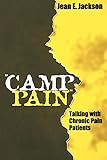"Camp Pain" : Talking with Chronic Pain Patients / Jean E. Jackson.
Material type: TextPublisher: Philadelphia : University of Pennsylvania Press, [2011]Copyright date: ©2000Description: 1 online resource (280 p.)Content type:
TextPublisher: Philadelphia : University of Pennsylvania Press, [2011]Copyright date: ©2000Description: 1 online resource (280 p.)Content type: - 9780812217155
- 9780812204735
- 616/.0472
- online - DeGruyter
- Issued also in print.
| Item type | Current library | Call number | URL | Status | Notes | Barcode | |
|---|---|---|---|---|---|---|---|
 eBook
eBook
|
Biblioteca "Angelicum" Pont. Univ. S.Tommaso d'Aquino Nuvola online | online - DeGruyter (Browse shelf(Opens below)) | Online access | Not for loan (Accesso limitato) | Accesso per gli utenti autorizzati / Access for authorized users | (dgr)9780812204735 |
Frontmatter -- Contents -- Acknowledgments -- Chapter 1. A Baffling Phenomenon -- Chapter 2. Summer Camp? Boot Camp? An Introduction to CPC -- Chapter 3. The Painful Journey -- Chapter 4. "Getting with the Program" -- Chapter 5. Building and Resisting Community -- Chapter 6. "Winners": CPC Converts -- Chapter 7. Me/Not-Me: Self, Language, and Pain -- Chapter 8. Conclusions: The Puzzles of Pain -- Coda: A Note on Approach -- Appendix 1: CPC Patients and Staff -- Appendix 2: Interview Questions -- Notes -- Bibliography -- Index
restricted access online access with authorization star
http://purl.org/coar/access_right/c_16ec
Pain is the most frequent cause of disability in America. And pain specialists estimate that as many as thirty to sixty million Americans suffer from chronic pain. Chronic pain is a complex phenomenon-often extremely difficult to treat, and surprisingly difficult to define.Just as medical literature in general neglects the experience of illness, so the clinical literature on pain neglects the experience of pain. "Camp Pain" takes an approach different from most studies of chronic pain, which are typically written from a medical or social perspective. Based on a year's fieldwork in a pain treatment center, this book focuses on patients' perspectives-on their experiences of pain, what these experiences mean to them, and how this meaning is socially constructed. Jackson explores the psychological burden imposed on many sufferers when they are judged not to have "real" pain, and by harsh moral judgments that sufferers are weak, malingering, or responsible in some way for their pain. Jackson also looks at the ways in which severe pain erodes and destroys personal identity, studying in particular the role of language.While keeping her focus on patients' experiences, Jackson explores Western concepts of disease, health, mind, and body; assumptions about cause and effect; and notions of shame, guilt, and stigma. "Camp Pain" does not attempt to resolve the uncertainties and misperceptions associated with pain but rather aims at enhancing our understanding of the wider implications of chronic pain by focusing on the sufferers themselves.
Issued also in print.
Mode of access: Internet via World Wide Web.
In English.
Description based on online resource; title from PDF title page (publisher's Web site, viewed 24. Apr 2022)


